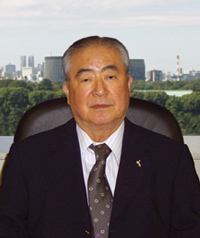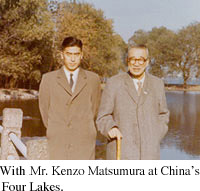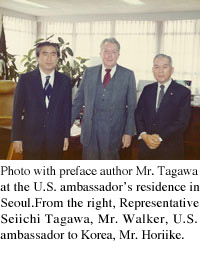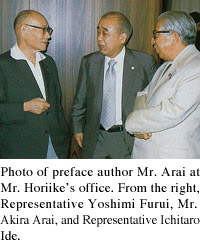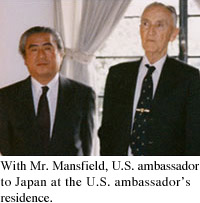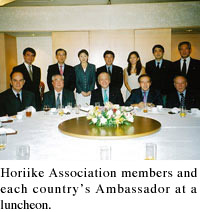It is not appropriate to introduce our founder, Tomoji Horiike by way of commonly used regime and greeting. He retreated from the bowling industry in the midst of the bowling boom in spite the fact that he had been leading the industry to promote the game and business. This action was based on a theoretical thought but easy to say, hard to do and it became legend later among many people concerned. When Japanese economy was rapidly growing (resulted in bubble economy afterwards), it was regarded as a kind of responsibility of top management to borrow money and expand his company. But he continued to turn down many financial offers from banks and strived for a zero-borrowing, small size but unique company. All the borrowings were repaid 20 years ago and the company is now concentrating on more specific fields.
Successive presidents and cabinet members of the Liberal Democratic Party of Japan visit our offices and the directly-managed restaurants, so some tend to think these people are peddling influence. If you read the prefaces written by friends Mr. Tagawa and Mr. Arai published in Mr. Horiike’s book, "Associations between Officials and Scholars," you will see that this is not the case. The succinct, straightforward prefaces express his personality and will be introduced here.
I have enjoyed a long relationship with the author, Tomoji Horiike. It has been about 30 years since I worked as a secretary of Mr. Kenzo Matsumura.
In our long relationship, I am always amazed at Mr. Horiike's wide social circle. He has many connections with people from the government, financial and administrative as well as from other fields, and he also has many overseas friends. With a stronger sense of justice than others, his relationships are not of the "being everyone's friend" type. He never forgets to draw a line between those who appear to be moving just in calculation of self-interest. He is the type of person who cannot say something he does not believe just to please others, but rather speaks his mind directly.
I believe that the reason why Mr. Horiike is so well-liked by "wise men" old enough to be his father such as Sino-Japanese relations forerunners Ryusuke Miyazaki, Kenzo Matsumura, and corporate pioneer Saburo Miyakawa, is attributed to such personality of Mr. Horiike.
While he is still not the age to record memoirs, he is not fond of seeking status or public office, Mr. Horiike is a rare breed of economic man who tirelessly backs up people of any age if he feels that such people have "potential."
In his free time and from his view overlooking the Imperial Palace, Mr Horiike wrote this book about the memories of his experiences through many relationships with his friends and businesses. With his razor-sharp personality, Mr. Horiike has put a pen on a paper lightly in his work and hobby essays, giving the reader an interesting glimpse into the lives of instructors in business and government.
The title Fui no Majiwari is taken from the passage, "Fui no majiwari, naofu, sougi" of the [Shihchi], a Chinese historical document. "Fui" means "commoner's clothes" in Chinese, and refers to someone of no official rank and low status. Encouraging us to form relationships that go beyond the trappings of status and rank, it is an apt title for the memoirs of Tomoji Horiike.
Seiichi Tagawa
Progressive Party Representative
Member of the House of RepresentativesTomoji Horiike is a man with an original tone and texture. He is a Daniel Boone who cannot be measured against the average corporate man or manager. It has been over 30 years since I met him through the man I respected and modeled myself after, the late Mr. Kenzo Matsumura in the latter half of 1950s. I have associated with Mr. Horiike as a truly affable, close friend.
As an entrepreneur, he developed his business step by step with his keen foresight and courage, and he has succeeded until now. He is by no means a salaried president who has been raised within the ranks of a large corporation. His fundamental ideas are different.
Another point of difference is his relationships with politicians. He seems to get along easily with politicians who have played important roles at key points in history but have not stood at the top of government. He makes his donations and then dedicatedly scrambles around for them. Depending on one’s perspective, he has deep relationship with people who appeared as heretics in the changes of the post-war governmental system.
He has a "let's root for the underdog" feeling to those people who do not follow the mainstream faction.
In this sense, Mr. Horiike may be said to be a businessman with an uncompromising sprit.
The article I contributed on his request to the "Monthly Starlanes Political Column" is now a sentimental monument of the time when I was an active reporter.
You will get a little sense of how this Daniel Boone, Tomoji Horiike, lives when you read this book.
Akira Arai
President of Nikkei Inc.
![]()
